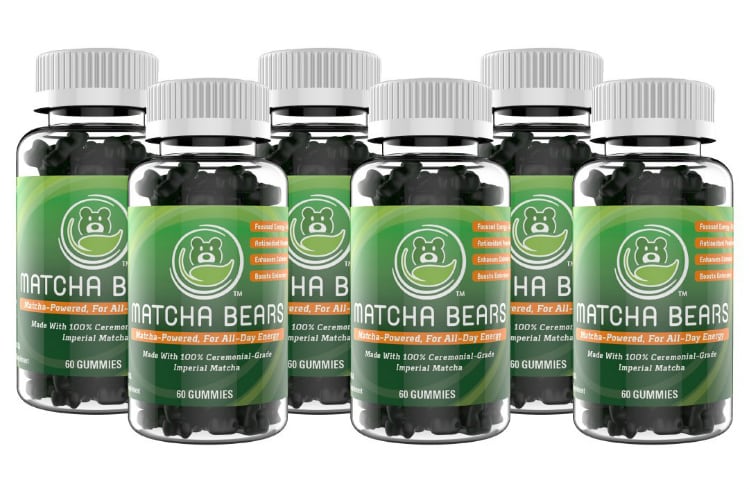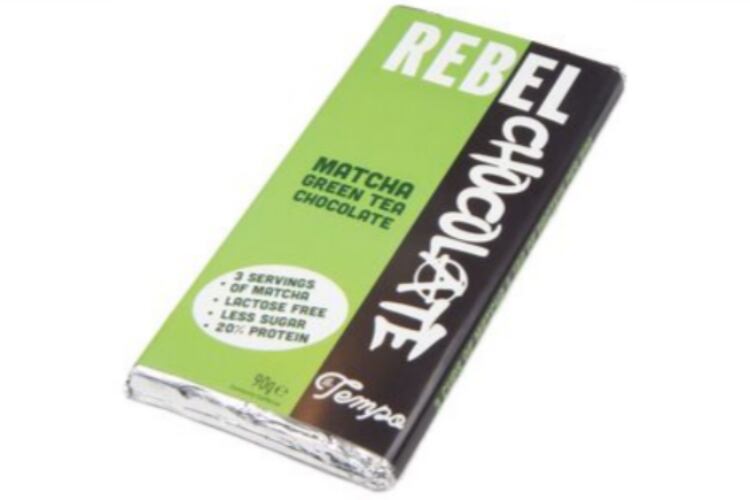Matcha Bears co-founder Adam Dadi and his two business partners – two real estate professionals and one in pharmaceuticals – have found an interesting mix of retailers interested in their gummies, which run for $24.98 for a 60-piece jar. (A 3-pack goes for $49.99 and a 6-pack for $89.99.) In addition to the now-standard online channels – both D2C and Amazon – and Whole Foods, lifestyle and clothing retailers like Urban Outfitters have taken notice.
Dadi, who works in real estate, admitted he was surprised to garner such interest from a clothing store, but he realized that many of these influential companies “have a really heavy online presence,” including content creation (blogs). They are seeking to fill consumer desire for health and wellness no matter the source, and ingestibles is one way to satisfy it.
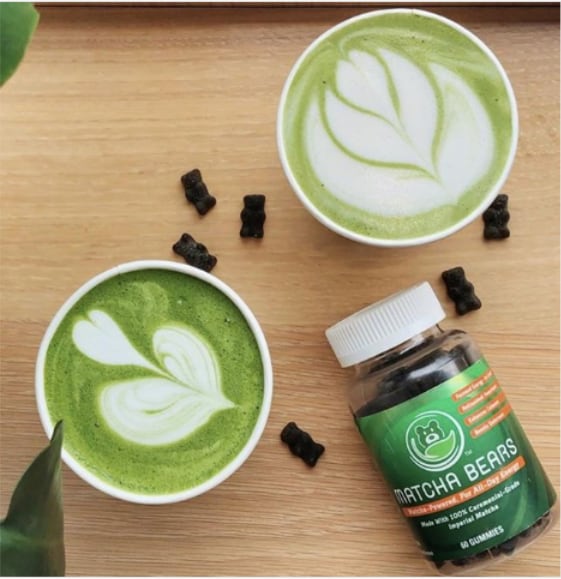
Its gummies strive to find a happy medium as ‘an everyday supplement’ for a range of consumers, from tea drinkers to health nuts to anyone that buys gummy vitamins.
“We didn’t want to get too pharmaceutical. We wanted it to be more of a fun product: We deliver benefits, but we don’t want it to be Hydroxycut,” said Dadi, referring to a popular supplement purported to aid weight loss.
“When you’re a little kid, you hear that caffeine is a drug, but when you get older…coffee is coffee. We don’t want to be labeled as a candy because what candy actually has superfoods in [it]? Our gummies have more of a melt-in-your-mouth taste. Some people tell us that they’re not sweet enough, but we’re not looking to make a candy.”
Plus, the price does not fit that category, though the company hopes it can reach a volume level to drop the price a bit, in part to beat out inevitable competitors.
The power of matcha
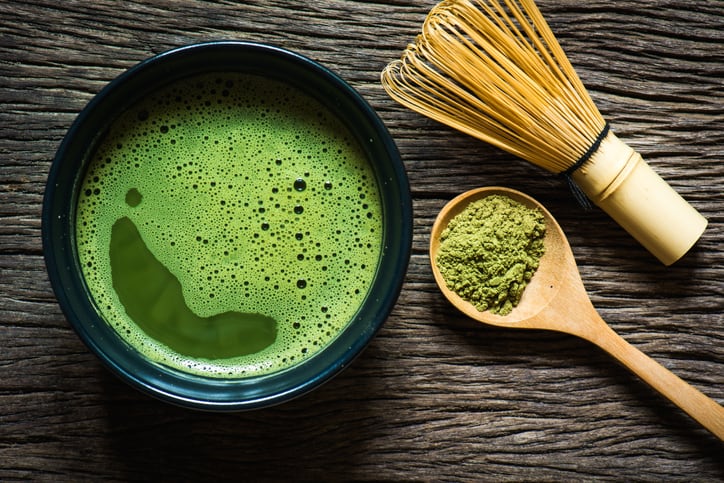
Matcha – tea powder finely milled from green tea leaves – has only recently become a household term in the West, though it has long been central to ceremonies in Japan. Its origins trace to 10th century China, and many Asian cultures enjoy the powder, whisked with hot water to form a creamy liquid.
Green tea offers a host of nutrients, such as calcium, magnesium, iron and zinc; the delicate leaves also boasts a cache of amino acids, including leucine, which stimulates muscle protein. Matcha, however, tends to cost more than oolong or sencha due to the labor-intensive process: growers shade leaves intended for matcha 20 days prior to harvest, which enhances levels of chlorophyll (color) and L-Theanine.
Researchers believe the latter amino acid modulates brain function, improving attention and alertness in humans, particularly in those with high anxiety.
Matcha Bears say its gummies offer that energy boost but without the crash effects of something like coffee.
“The way that matcha hits you is so different from coffee,” Dadi told ConfectioneryNews. “It enhances calmness. Your heart doesn’t race; you feel very calm and collected, but you also feel very focused and energized.”
Matcha gummies to the rescue
Dadi wanted a way to enjoy these benefits quickly and conveniently. He started making matcha tea at home around 2014, around the time it took off in the US, in an effort to lose weight and avoid coffee.
“I was originally mixing it with a spoon; it was so grainy and I didn’t really like it,” so he splurged on a chasen (the wooden bamboo whisk) and researched how to make the best matcha online.
Finally, he told ConfectioneryNews, “it came out delicious”: warming, velvety and sweet. This revelation led to a near-obsession with matcha.
“It gave me the same energy as coffee but without the jitteriness. I wasn’t nervous. It kept me going,” said Dadi, who added the likes of matcha soba noodles to his culinary repertoire.
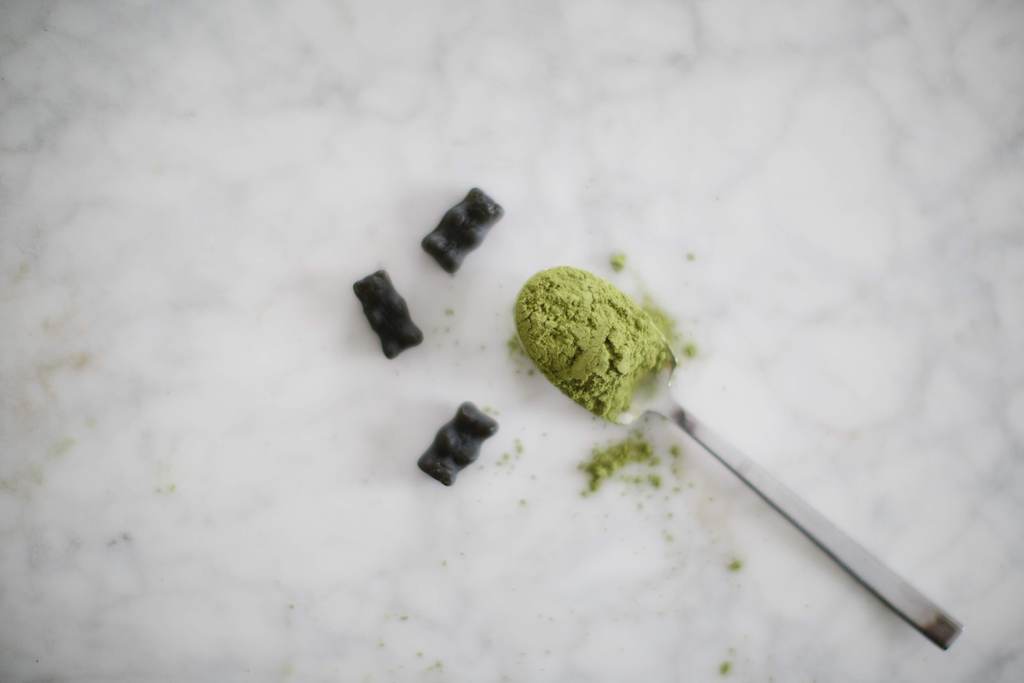
But just as using a Chemex to slowly drip coffee through a filter, a proper cup of matcha requires the proper tools and time. Dadi set out to deliver matcha in a ‘fun form with less hassle,’ an idea that evolved into a super-clean gummy that was enjoyable to eat – not chalky or powdery.
“Making matcha is a process,” he told us, but living in New York City, people demand convenience. “They don’t want elevators; they want to live on the first floor. They want everything mobile.”
Two gummies (or one serving) provide about 250mg of matcha, which offers the equivalent of 10 cups of green tea.
The formula eschews the typical corn syrup for glucose, and adds citrus pectin and cane sugar. In addition to being free from five major allergens (nuts, soy, milk, eggs, gluten), the product is free from artificial colors and preservatives.
Dadi and his partners opted at first for ceremonial-grade matcha – used in the traditional Japanese beverage – but determined the premium version was just as effective and for a lower cost.
They also used corn syrup in the gummies’ first iteration, but Dadi told us its omission “actually gave the gummies a better texture and consistency that I think people are enjoying more.”
Growing the functional gummy category through matcha
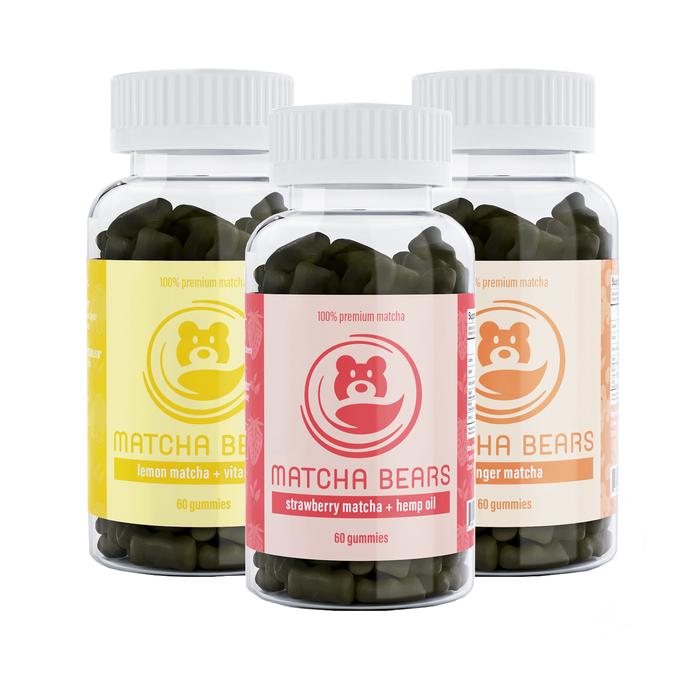
“It’s an odd category, but it’s more of the needs category,” said Dadi when asked about how he views Matcha Bears in the marketplace. “We’re really looking to build it and create something that seems fun and very clean and interesting. But the main thing is just having a clean product – something that’s not going to be too hard-line as a supplement.”
For now, Matcha Bears will focus on honing the product and growing awareness through creative grassroots marketing. One of the first steps was adding three new SKUs: Ginger Matcha, Strawberry & Hemp Oil, and Lemon & Vitamin C. While they all contain matcha, they carry less than the original to appeal to consumers who might not adore the main ingredient’s earthiness.
In the long run, Dadi hopes to expand the product line into other areas, such as to ease sleep, and perhaps build a multivitamin with matcha at the core.
---
Studies:
Beneficial effects of green tea: A literature review
Chinese Medicine – Volume 5, Issue 13, April 2010
Authors: S.M. Chacko, P.T. Thambi, R. Kuttan, I. Nishigaki
L-theanine, a natural constituent in tea, and its effect on mental state
Asia Pacific Journal of Clinical Nutrition – Volume 17, S1, pg. 167-8, 2008
Authors: A.C. Nobre, A. Rao, G.N. Owen

